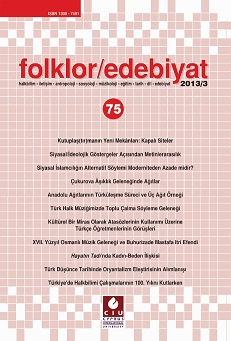Siyasal/İdeolojik Göstergeler Açisindan Metinlerarasilik: Kemalist İdeolojinin Temel Belirteçlerinin Sinema Ve Edebiyattaki Uzantıları
Intertextuality with Reference to the Politico-Ideological Signs: The Extensions of Fun Damental Indicators of Kemalist Ideology in Film and Literature
Author(s): Süreyya ÇakırSubject(s): Aesthetics, Social Philosophy, History of ideas, Social history, Turkish Literature, Philosophy of Language, Film / Cinema / Cinematography
Published by: Uluslararası Kıbrıs Üniversitesi
Keywords: Kemalist Ideology; Intertextuality; Film-Literature; Yılanların Öcü Novel and Movie;
Summary/Abstract: Intertextuality is accompanied with the conditionings of the socio-political history as well as the cultural and ideological indicators of every certain historical period. Considering the Turkish social history, it is possible to see these conditionings as ‘data of the same era’ in the relationship between literature and cinema. There are links between the Kemalist ideology, which had been one of the constitutive tendencies in Turkish political life approximately up until the 1980s and which takes the problematics of ‘progress, enlightenment and development’ as the departure point of its politics and the discourse of the ‘social-realistic’ literature of 1950’s. This discourse was reproduced between the years 1960-65 in connection with the New-Kemalist ideology in ‘social-realistic’ films, one branch of which is literary adaptations. This intertextual transfer from literature to cinema can be detected in Yılanların Öcü. This paper intends to associate intertextuality with the indicators and conditionings pertaining to the Turkish political life. To this end, firstly, it will focus on the fundamental assertions –peculiar to the Turkish political life- of the politico-ideological context nourished by this intertextuality, which are also echoed in the aesthetic culture. Next, Yılanların Öcü, both the novel and movie, will be analyzed in connection with the ideology and the fundamental assertions of the historical period they are shaped in with respect to a Bakhtinian perspective of intertextuality, which is based upon the interplay between different discursive genres materialized in a certain “historical period”.
Journal: Folklor/Edebiyat
- Issue Year: 19/2013
- Issue No: 75
- Page Range: 37-50
- Page Count: 14
- Language: Turkish

